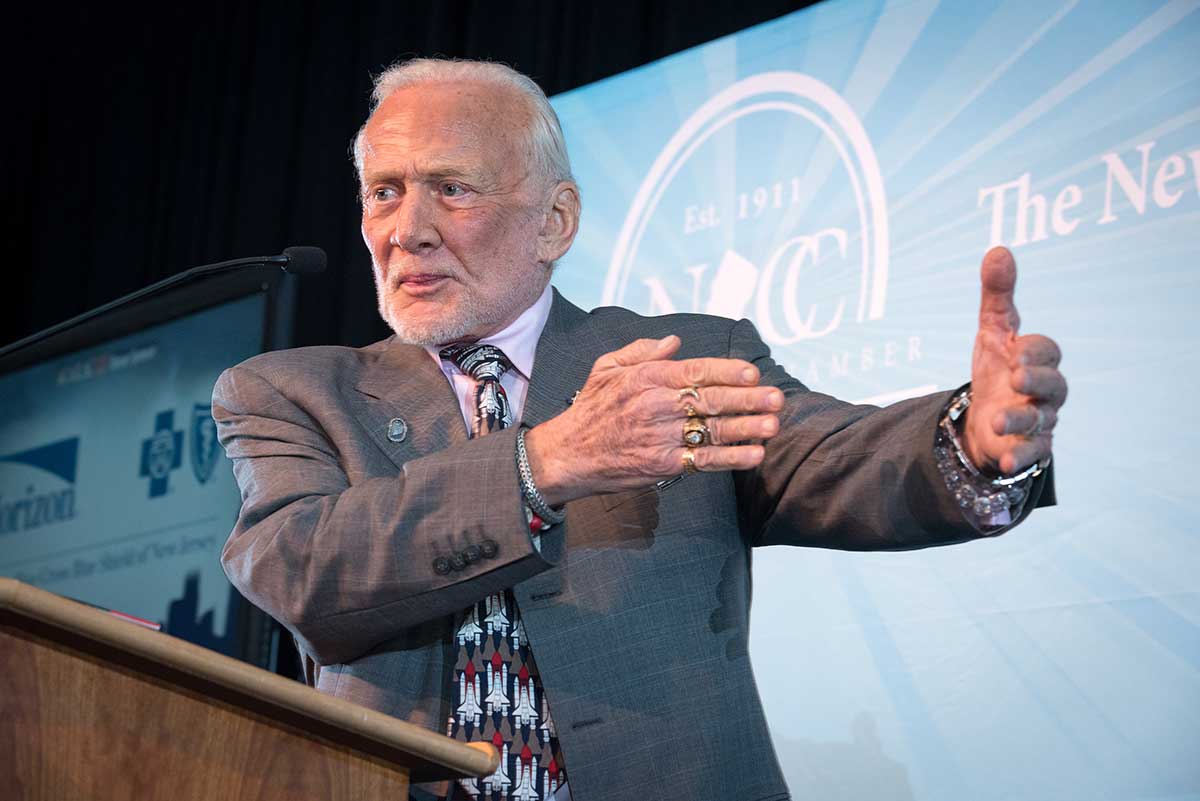When New Jersey-native Buzz Aldrin was a youngster, who could imagine that he - or anybody - would one day walk on the moon? But if you looked hard enough, there were celestial signs. His mother's maiden name was Moon. She was born the same year the Wright brothers first took flight. Aldrin's father was an aviator, and Buzz took a great interest in space exploration when he was a student at Montclair High School bound for West Point.
"How about this - my MIT-bound high school classmate wrote in my yearbook: 'Rocketman - I'll build 'em, you fly 'em,'" Aldrin said during an off-the-cuff address the New Jersey Chamber of Commerce iGALA on Oct. 26.
The rest is history. Aldrin, then 38, and Neil Armstrong walked on the moon in July of 1969, a feat witnessed on TV by more than 600 million people - by far the largest television audience of its time.
Buzz Returns Home
Buzz, now living in Florida, returned home to attend the Chamber's iGALA and receive the N.J. Chamber's Lifetime Innovation Achievement Award. Also honored at the iGALA were Dr. Michio Kaku, the physicist and television personality who served as the evening's keynote speaker; and physicist Dr. Shirley Ann Jackson, president of Rensselaer Polytechnic Institute (RPI) and the first African-American woman to earn a doctorate at MIT.
Innovation was the theme of the evening. Among the 500 guests at The Palace in Somerset were CEOs, heads of the state's most prestigious research firms, and academic leaders.
Dr. Jackson received the N.J. Chamber's inaugural Alice H. Parker Leaders in Innovation Award. In addition to her service at Bell Laboratories, Dr. Jackson was a professor of physics at Rutgers for five years, and served as Chair of the Nuclear Regulatory Commission during the Clinton administration.
The theme of Jackson's acceptance speech was: Don't let the unlikely stop you. She recalls a professor at MIT suggesting she choose a different course of study even while she was one of the top students in the class.
'Humanity's Most Audacious Achievement'
Jackson, meanwhile, referred to Aldrin, seated at the table directly in front of the stage, and said, Aldrin's "walk on the moon represents humanity's most audacious achievement."
Kaku, in his keynote, said Aldrin and his Apollo 11 crewmates were especially courageous because the technology NASA was dealing with in the late 1960s was comparable to the technology inside one of today's cell phones.
Later, in his acceptance speech, Aldrin good naturedly disputed Kaku's characterization. "A cell phone can fly if you throw it," Aldrin said, "but I have yet to see a cell phone land a Lunar Module safely on the moon."
A Mission to Mars
The 85-year-old Aldrin has not lost his sense of mission. He actively promotes efforts to get students involved in careers related to math, science and engineering. And he is somewhat famously calling for NASA and the international community to push toward a human mission to Mars. "We should be striving to send people to Mars" Aldrin told the iGALA audience. "We can colonize the planet and make humans a two-planet species."
Aldrin acknowledged this won't happen in his lifetime, but he said the U.S. president whose administration accomplishes this would be immortalized - remembered for thousands of years."
Thousands of years? That could describe how long Aldrin and Armstrong may be remembered for their lunar achievement.
"Apollo 11 was the rarest of events," said Amy Mansue, chair of the New Jersey Chamber of Commerce, when introducing Aldrin. "Nothing like it had ever happened before and nothing like it could happen again. Only once could humans for the first time set foot on a world other than Earth."
For photos from the event, click on an image below:
{eventgallery event='72157667359745433' attr=images mode=link max_images=38 thumb_width=50 offset=0 }
